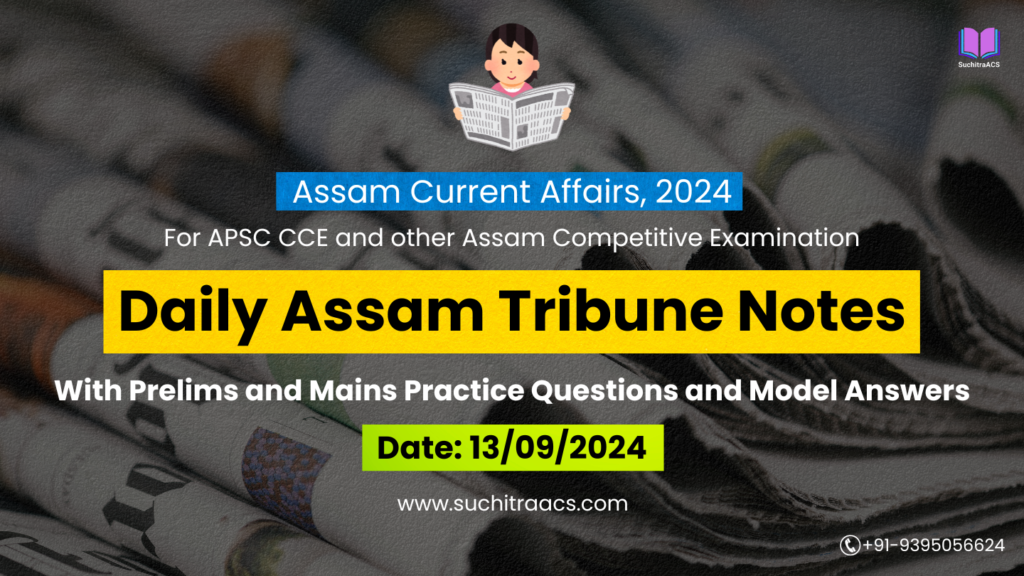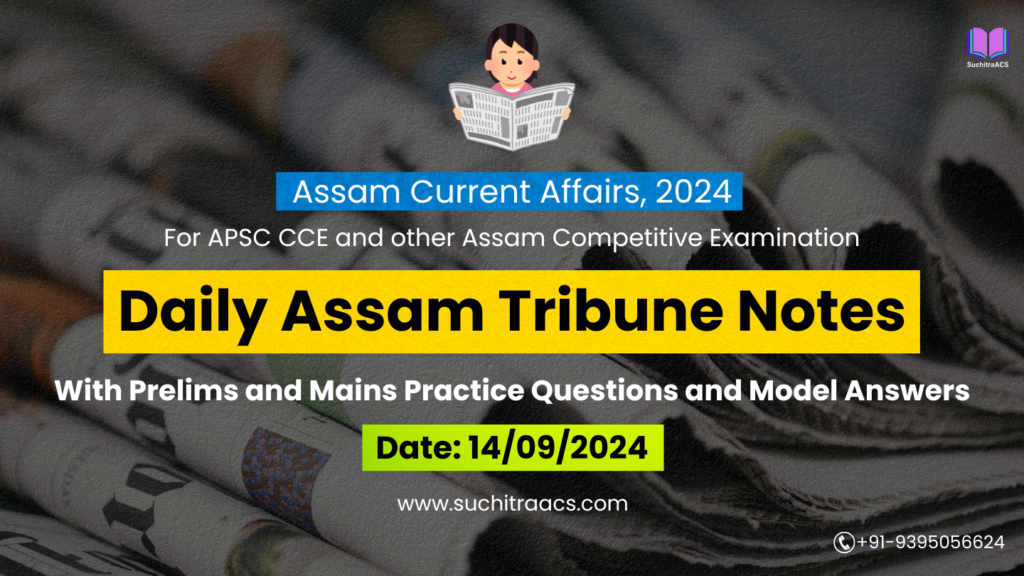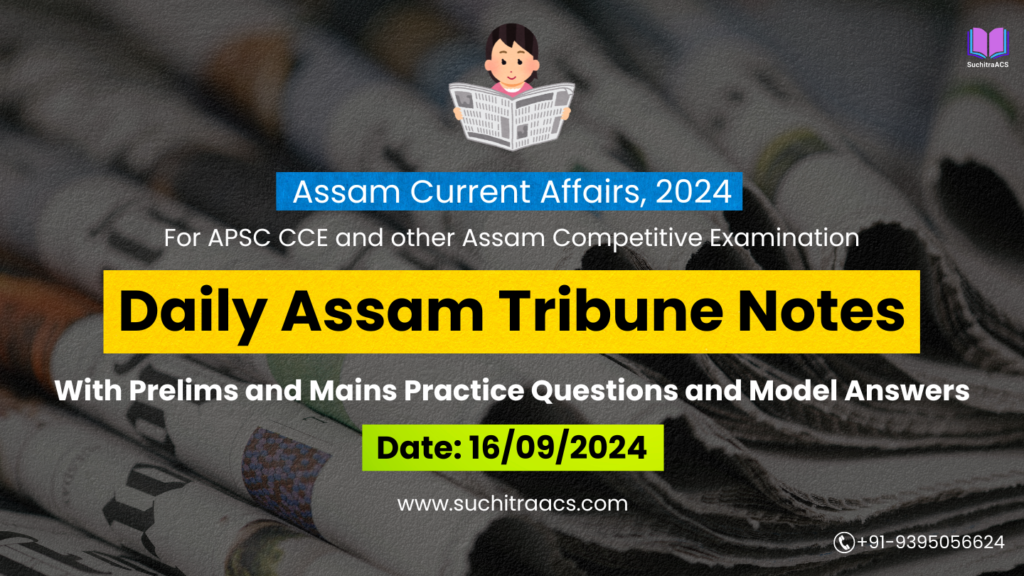1. Clause 6 of the Assam Accord and Justice (retd) Biplab Kumar Sharma Committee Report
- Relevance: Directly connects with General Studies-V: History, Heritage, Culture, Geography, Governance, Polity, Social Justice, International Relations, Economic Development, Bio-diversity, Environment, Security and Disaster Management of Assam in the APSC CCE Mains syllabus.
- Background: The Assam Accord of 1985 was signed to resolve the Assam Agitation, primarily concerning the issue of illegal immigration. Clause 6 of the Accord promised constitutional, legislative, and administrative safeguards to protect, preserve, and promote the cultural, social, linguistic identity, and heritage of the Assamese people.
- Justice (retd) Biplab Kumar Sharma Committee: Constituted in 2019 to recommend measures for implementing Clause 6.
- Key Recommendations: The committee submitted its report in 2020, making various recommendations related to land rights, language, culture, and economic development of indigenous Assamese people.
- Current Status: The Assam government is in the process of categorizing and implementing the recommendations, with a focus on those under the state’s jurisdiction. Discussions with the Central government and the AASU are also planned for recommendations requiring Central intervention or constitutional amendments.
- Significance for Assam: The implementation of Clause 6 recommendations is crucial for safeguarding the interests of the indigenous Assamese people and addressing their concerns related to identity and cultural preservation.
2. Power Cuts in Assam
- Relevance: Aligns with General Studies-III: Technology, Economic Development, Biodiversity, Environment, Security and Disaster Management in the APSC CCE Mains syllabus. It also touches upon governance and public service delivery, relevant to General Studies-II.
- Reasons for Power Cuts:
- Increased power demand in recent years, exceeding the capacity of the existing infrastructure.
- Aging infrastructure of the Assam Power Distribution Company (APDCL), including transformers and supply lines.
- Ongoing infrastructure development and construction works requiring temporary power cuts for safety.
- Government’s Response:
- Efforts to augment infrastructure and increase transformer capacity.
- Installation of smart meters to prevent power theft and ensure accurate billing.
- Introduction of time-of-day tariffs to incentivize power usage during non-peak hours.
- Significance: Reliable power supply is essential for economic development, industrial growth, and improving the quality of life in Assam. Addressing the issue of power cuts is crucial for the state’s progress.
3. Drugs Haul Case and Gauhati High Court Order
- Relevance: Concerns governance, law and order, and the judiciary, making it pertinent to General Studies-II: Governance, Constitution, Polity, Social Justice and International relations in the APSC CCE Mains syllabus.
- Case Details: A large quantity of drugs was seized in Karbi Anglong in 2022. Two accused were convicted by a local court, but the Gauhati High Court quashed the order due to non-compliance with the NDPS Act.
- High Court’s Concerns:
- The investigating officer was unaware of the whereabouts of the seized drugs.
- Non-compliance with procedures related to search, seizure, and disposal of narcotics.
- Doubts regarding the sealing and handling of the seized contraband.
- High Court’s Directives:
- Inquiry into the status of the seized drugs.
- Report from the District & Sessions Judge and the District Drug Disposal Committee regarding the disposal of narcotics.
- Significance: The case highlights the importance of adhering to legal procedures in drug-related cases and ensuring the proper handling and disposal of seized contraband.
4. India-China Relations and Border Issues
- Relevance: Directly relates to General Studies-II: Governance, Constitution, Polity, Social Justice and International relations in the APSC CCE Mains syllabus, specifically the aspect of international relations.
- Current Status: The relationship between India and China remains strained due to ongoing border disputes, particularly in the Ladakh region.
- Key Concerns:
- The Line of Actual Control (LAC) is not clearly demarcated, leading to frequent standoffs and tensions.
- China’s increasing assertiveness in the region, including its infrastructure development activities near the border.
- The potential for conflict escalation due to miscalculations or misunderstandings.
- India’s Stance:
- Maintaining a firm stance on border issues and advocating for a peaceful resolution through dialogue and negotiations.
- Enhancing military preparedness and infrastructure development along the border.
- Strengthening strategic partnerships with other countries in the region to counterbalance China’s influence.
Significance: A stable and peaceful border with China is crucial for India’s security and economic development. Resolving the border disputes and maintaining a constructive relationship with China is a key foreign policy challenge for India.
APSC Prelims Practice Questions
1. Clause 6 of the Assam Accord
Question: Which of the following statements is/are correct regarding Clause 6 of the Assam Accord?
(i) It guarantees constitutional, legislative, and administrative safeguards to protect the cultural, social, linguistic identity, and heritage of the Assamese people.
(ii) The Justice (retd) Biplab Kumar Sharma Committee was formed to oversee the implementation of Clause 6.
(iii) The Assam government has accepted the 1951 cut-off date for all recommendations related to Clause 6.
(iv) The implementation of Clause 6 recommendations will be uniform across all regions of Assam, including the Barak Valley and Sixth Schedule areas.
Select the correct answer using the codes given below:
(A) (i) and (ii) only
(B) (i), (ii), and (iii) only
(C) (ii) and (iv) only
(D) (i), (ii), (iii), and (iv)
Answer: (A)
Explanation: Statement (i) is correct as Clause 6 does provide these safeguards. Statement (ii) is also correct as the committee was formed for this purpose. Statement (iii) is incorrect as the 1951 cut-off date is applicable only to certain specific recommendations. Statement (iv) is incorrect as implementation in the Barak Valley and Sixth Schedule areas has specific considerations.
2. Power Cuts in Assam
Question: Which of the following is NOT cited as a reason for power cuts in Assam?
(A) Increased power demand exceeding the capacity of existing infrastructure
(B) Aging infrastructure of the Assam Power Distribution Company (APDCL)
(C) Excessive reliance on renewable energy sources
(D) Ongoing infrastructure development and construction works
Answer: (C)
Explanation: The newspaper article mentions increased demand, aging infrastructure, and construction works as reasons for power cuts. Excessive reliance on renewable energy is not mentioned as a contributing factor.
3. Drugs Haul Case and Gauhati High Court Order
Question: In the drugs haul case in Karbi Anglong, the Gauhati High Court quashed the lower court’s order due to:
(A) Lack of evidence against the accused
(B) Non-compliance with the NDPS Act
(C) The investigating officer being unaware of the seized drugs’ whereabouts
(D) Both (B) and (C)
Answer: (D)
Explanation: The High Court quashed the order due to both non-compliance with the NDPS Act and the investigating officer’s lack of knowledge about the seized drugs.
4. India-China Relations
Question: Which of the following statements best reflects India’s current stance on its relationship with China?
(A) India seeks to escalate tensions with China to resolve border disputes quickly
(B) India is solely reliant on dialogue and negotiations to resolve border issues
(C) India maintains a firm stance on border issues while advocating for a peaceful resolution through dialogue and enhancing military preparedness
(D) India is actively seeking military alliances with other countries to confront China directly
Answer: (C)
Explanation: The newspaper article highlights India’s firm stance on border issues, its preference for peaceful resolution through dialogue, and its efforts to enhance military preparedness. It does not mention escalating tensions or seeking direct military confrontation.
APSC Mains Practice Question
Question: The recent escalation in the Israel-Palestine conflict has raised concerns about the potential for regional instability and its implications for India. Analyze the impact of this conflict on India’s foreign policy and national security interests. Suggest measures that India can take to contribute to a peaceful resolution of the conflict. (250 words)
Model Answer
The ongoing Israel-Palestine conflict poses a complex challenge for India’s foreign policy and national security interests. India has traditionally maintained a balanced approach towards the conflict, advocating for a two-state solution based on mutual recognition and peaceful coexistence. However, the recent escalation has put India in a delicate position, requiring it to navigate the complexities of the situation while safeguarding its own interests.
Impact on India’s Foreign Policy and National Security
- Energy Security: The conflict could disrupt energy supplies from the Middle East, impacting India’s energy security. Any instability in the region could lead to oil price volatility, affecting India’s economy.
- Diaspora Community: India has a significant diaspora community in both Israel and Palestine. The conflict could pose a threat to their safety and well-being, requiring India to take measures to ensure their protection.
- Regional Stability: The escalation could destabilize the entire Middle East region, leading to a spillover of violence and extremism. This could have a direct impact on India’s security, given its proximity to the region.
- Bilateral Relations: India has strong ties with both Israel and Palestine. The conflict could strain these relationships, requiring India to maintain a delicate balance.
- International Image: India’s response to the conflict will be closely watched by the international community. It is important for India to maintain its image as a responsible and peace-loving nation.
Measures India Can Take
- Diplomatic Efforts: India should continue its diplomatic efforts to de-escalate the situation and promote a peaceful resolution through dialogue and negotiations. It can leverage its good relations with both sides to facilitate talks and build trust.
- Humanitarian Assistance: India should provide humanitarian assistance to the affected populations in both Israel and Palestine. This will demonstrate India’s commitment to peace and human rights.
- Diaspora Protection: India should take necessary measures to ensure the safety and security of its diaspora community in the conflict zone. This could involve providing consular assistance, facilitating evacuations if necessary, and coordinating with local authorities.
- Regional Cooperation: India should work with other countries in the region to promote peace and stability. It can play a constructive role in regional forums and initiatives aimed at resolving the conflict.
- UN Engagement: India should actively engage in the UN Security Council and other international forums to push for a peaceful resolution of the conflict. It should advocate for a two-state solution and support efforts to address the root causes of the conflict.
Conclusion
The Israel-Palestine conflict presents a significant challenge for India’s foreign policy and national security. India needs to adopt a nuanced and proactive approach to navigate the complexities of the situation while safeguarding its own interests. By promoting dialogue, providing humanitarian assistance, and engaging with regional and international partners, India can contribute to a peaceful resolution of the conflict and ensure its own security and stability.
✨ Looking for top-quality APSC online coaching at an affordable price?

🔔 Join Our WhatsApp Study Group!
For exclusive access to premium quality content, including study materials, current affairs, MCQs, and model answers for APSC CCE and other Assam competitive exams.
Click here to join: SuchitraACS Study WhatsApp Group
📚 Want to know more about SuchitraACS’s most affordable courses?
Click here to know more: SuchitraACS Courses for APSC CCE and Assam Competitive Examinations




